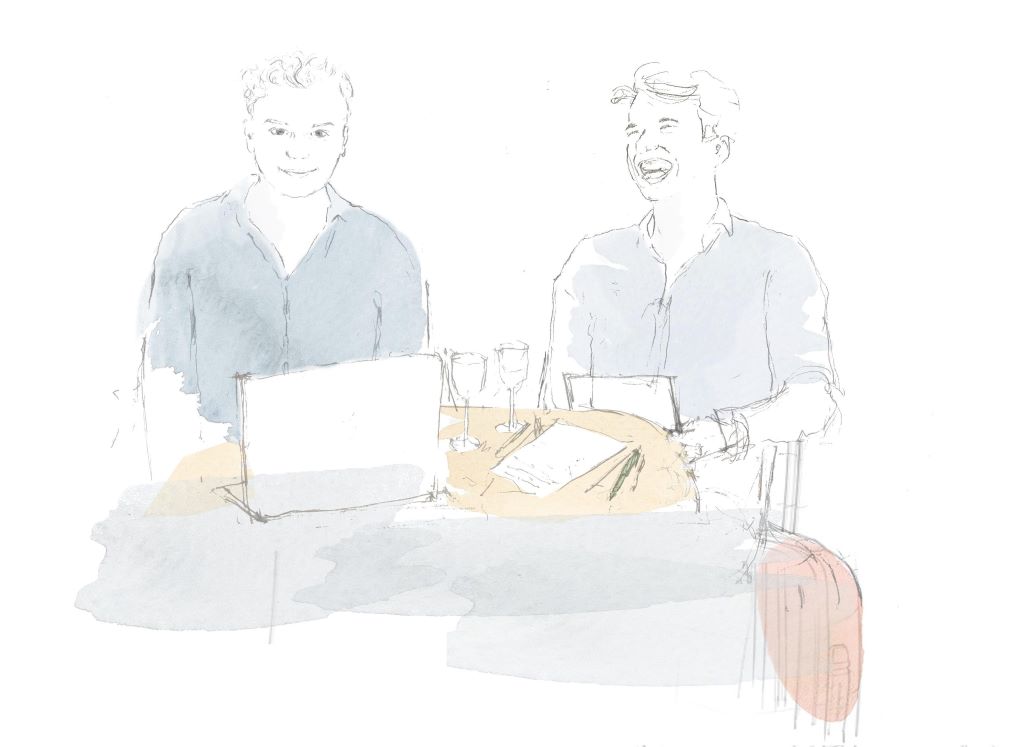
This is an experiment. It’s a challenge we trust our readers will rise to. In search of a form that does justice to its age, it lays bare the horizontal dimension running through any set of conversations.
A simple swipe is all it takes to navigate: up or down, left and right.
Every conversation stands for itself and can be read in full as usual. Yet whoever dares foray to the left or right will rediscover the same subject through a different lens. These links interpenetrate our conversations like a weft traversing manifold strands of warp. A simple swipe is all it takes to navigate: up or down, left and right.
These connections are sometimes subtle, sometimes obvious, and always handcrafted. They sedulously uncover a fundamental layer common to all discourses where silent assumptions reveal themselves and contradictions come to the fore, where ideas betray their provenance and, possibly, even that which isn’t said becomes transparent. Thus arranged, the figures assembled here appear in their two roles simultaneously: as both spectators and actors in the world theatre – “Zeitgeister”, if a German pun may pass unpunished.
To forestall any misunderstanding: An enterprise so youthfully presumptuous is destined to fall short of its noble ambitions and can be a productive failure at best. And needless to say that – as with all invitations (ours at least) – any gathering of 21 people will owe no less to chance than to choice.
This volume was published in German on the 1st of February 2021.
And yet, the questions perturbing us not only since last year do not lend themselves to definitive answers and tend to be drowned out by the present. To investigate and explore them without inhibitions or prejudice is a privilege of youth, perhaps. This volume was published in German on the 1st of February 2021.
In 2020, a preceding project on the European elections called »Das kleine Einmaleins der Europawahlen« (German only) was awarded the Altiero-Spinelli-Preis by the European Commission. We thus found ourselves in the fortunate position to be able to cover the minor expenses incurred with our own independent funds. All else has been taken care of by our spare time and effort.
These conversations have been a most gratifying pastime that only our readers’ joy can duly requite. Those willing to delve into it may find, if nothing else, delight.
Lucius Maltzan
& Simon Nehrer
Imprint
EDITORS
Lucius Maltzan & Simon Nehrer
PUBLICITY
Dina Körzdörfer
DRAWINGS
Sophie Lin @ie_soph
CODING
Jakob Wonisch
WEBDESIGN
Simon Nehrer & Jakob Wonisch
VIDEO EDITING
Valentin Macke
SPECIAL THANKS TO
Felix Oblin
PLEASE SEND LOVE LETTERS AND DEATH THREATS TO
PRIVACY POLICY

Paul Collier
The Economist
Paul Collier is a British development economist and director of the International Growth Centre. “Exodus” and “The Future of Capitalism” are among his most successful publications.
Start
Crisis
Cleavages and Bridges
Work
Family
Defining Boundaries
Brexit
Faith
Utopia

Ursula von der Leyen
The President
Ursula von der Leyen is the current President of the European Commission. A German Christian Democrat, she had previously served as Minister of Defence, of Family Affairs, and of Labour.
Start
Europe
Economy
Climate
Foreign Policy
Democracy
Science
Traditions
Madame President

Gregor Gysi
The Veteran Socialist
Gregor Gysi is a German lawyer and politician. He was leader of the East German Socialist Unity Party (SED) when the GDR collapsed. Today, he is a long-standing parlamentarian of the socialist party "Die Linke" and a widely respected elder statesman.
Start
Crisis
Councils and Consultants
War & Peace
Europe
Government vs. Market
Left-Back
Climate
False Splendour
Insights and Outlooks

Felicitas Hoppe
The Author
Felicitas Hoppe is a German author. She was awarded the prestigious Georg Büchner Prize in 2012. Recent publications include “Prawda” and “Hoppe”.
Start
Writings
Toothless Old Men
Playing Roles
Ideals and Ideologies
Unambiguously ambiguous
Exit Strategies
Land of the Free
Vitae Cursus

Josef Hader
The Comedian
Joseph Hader is an Austrian cabaret artist and national treasure. His performances, acting, and directing are popular across the German-speaking world.
Start
Humour
Crisis
The End of Enlightenment
Creative Urge
Humanism
Freedom
Immortality
Europe
Young & Old
That's Life

Kevin Kühnert
The Young Socialist
Kevin Kühnert gained widespread recognition as leader of the German Social Democrats' youth wing. He is now a party vice-president and member of the Bundestag for Berlin.
Start
Crisis
Government vs. Market
UBI
Social Democracy
Foreign Policy
Europe
Democracy
Climate
Debate
Buddhism & Tourism

Hartmut Rosa
The Sociologist
Hartmut Rosa is professor of sociology at the Friedrich Schiller University Jena and a leading protagonist in the tradition of critical theory. His opera magna are called “Social Acceleration” and “Resonance”.
Start
Crisis
Acceleration
Modern Pressures
Freedom
Art
Approaching the World
Europe
Resonance
Brave New World

Giovanni di Lorenzo
The Editor-in-chief
Giovanni di Lorenzo is a German-Italian journalist. He has been editor-in-chief of Germany's renowned weekly “Die Zeit” since 2004.
Start
Crisis
Journalism
Social Media
Democracy
Europe
Religion
Task for Humanity

Peter Sloterdijk
The Philosopher
Peter Sloterdijk is a German philosopher and author. His work ranges from the legendary “Critique of Cynical Reason” published in 1983 to the recently released "After God”.
Start
The Relishing State
Shark Tank
Two-third socialism
The Discovery of Work
Rich Parents for All
The Virtues of Hypocrisy
Europe
School Tragedies
Life without Excuses

Daniel Barenboim
The Maestro
Apart from his achievements as a pianist, Daniel Barenboim has also held the baton at the Orchestre de Paris, the Chicago Symphony Orchestra, and the Berlin Staatskapelle. He is an Argentinian of Israeli descent and a co-founder of the West-Eastern Divan Orchestra.
Start
Europe
New Sounds
Don't Need No Education
Perpetual Peace
Art and Market
Requiem
A Life in Music
Test
Hint: Navigate using the arrow keys!


